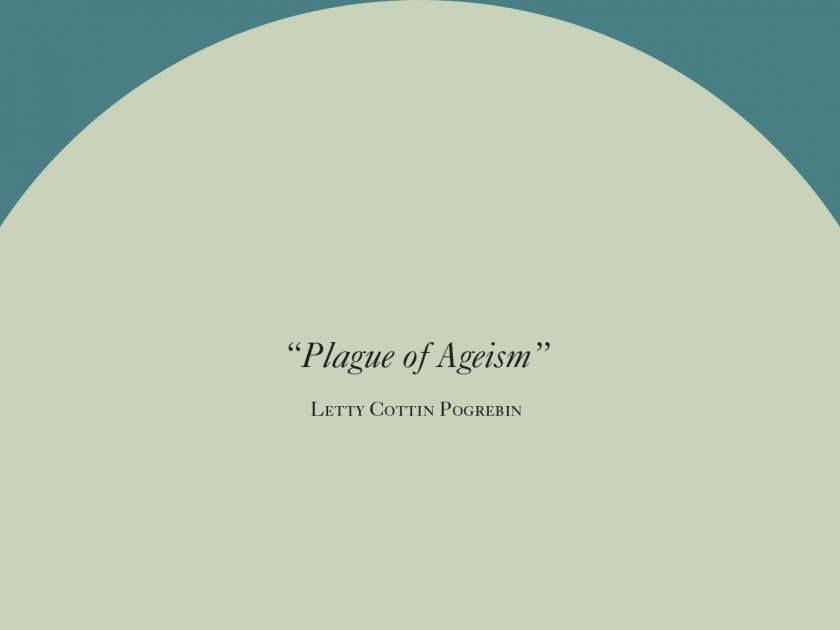
The below piece was produced as a part of a Passover supplement for Dwelling in a Time of Plagues in response to the idea of liberation from the plague of ageism.
I used to think old people were either cute or sad.
The cute ones were Kirk Douglas or Ruth Bader Ginsburg doing push-ups, and gray-haired couples animatedly talking to each other or walking hand in hand in the park. The sad ones were stooped, infirm, inept, crotchety, disheveled, occasionally incoherent, and mostly invisible. I used to laugh when comedians mocked elderly men who still flirt when a pretty girl passes by, and 80-something women who still dress with panache and take pains with their make-up as if they had a prayer of attracting the male gaze. In other words, having absorbed from the world around me its negative stereotypes of “seniors,” and its cultish adoration of youth, I’d succumbed to the plague of ageism.
Since turning 60, then 70, then, incredibly, 80, I’ve cringed at age-related stereotypes and raged not just at the ‘dying of the light’ — Dylan Thomas’ immortal phrase for mortality tremors — but at the maddening societal attitudes that dismiss my cohort as over the hill has-beens.
In 2017, America’s seniors totaled more than 46 million, a number expected to nearly double over the next 30 years. Yet children and young people are still being indoctrinated with the same disparaging images and demeaning mindsets about age and aging that I grew up with.
Jewish tradition, though more balanced, sends mixed messages. On the one hand, our liturgy and sacred texts constantly refer to elders as repositories of wisdom, compassion, experience, understanding, judgement, and insight. The Torah reminds us that “Moses was 80 and Aaron was 83 when they made their demand on Pharaoh,” an act of immense courage and chutzpah. The Talmud calls 80 ‘the age of strength.” Proverbs describes “a hoary head,” (gray hair) as “a crown of glory,” implying that longevity is the reward for a life of righteousness.
On the other hand, we also encounter descriptions in granular detail of the depredations and burdens of age — dimmed vision, physical weakness, mental confusion — and perplexing paradoxes. Leviticus commands, “You must rise up before the aged and honor the face of the older person; you must fear your God,” aligning the will of the deity with the dignity of the aged and suggesting that Adonai stands ready to police ageism. Yet during the High Holy Days, Shema Koleinu has us reciting the Psalmist’s plea, “Do not cast us off in old age; when our strength fails, do not forsake us.” Surely, I’m not the only one who hears those words as an indirect expression of, dare I say it, the divinity’s occasional slide into ageism. Why else would God require an explicit request to not abandon those who are weaker than they once were.
Just as our inherited tradition tries to reconcile these contradictions, so should we tackle the scourge of age-bias and confront the idolatrous worship of youth. We must assume the best (imputing to older people personal value, continuing capacities and aspirations), while accommodating to the worst (the inevitable depletions of age) by providing care and kindness until the end of life. Anything less will be a plague on humanity and a shanda for our people.
To download the full Passover supplement, which includes ten authors and ten artists responding to ten modern plagues, please click here.
Dwelling in a Time of Plagues is a Jewish creative response to real-world plagues of our time. Collectively, the commissions in this constellation of art projects around North America grapple with contemporary crises: the global pandemic, institutional racism, xenophobia, ageism, forced isolation, and the climate crisis. Dwelling is generously supported by CANVAS.
Co-founder of Ms. magazine, Letty Cottin Pogrebin is a nationally acclaimed writer, activist, and public speaker. The author of twelve books, her articles and essays have appeared widely. She is a co-founder of the National Women’s Political Caucus and the Ms. Foundation for Women; a past president of the Authors Guild and the recipient of numerous honors and awards.